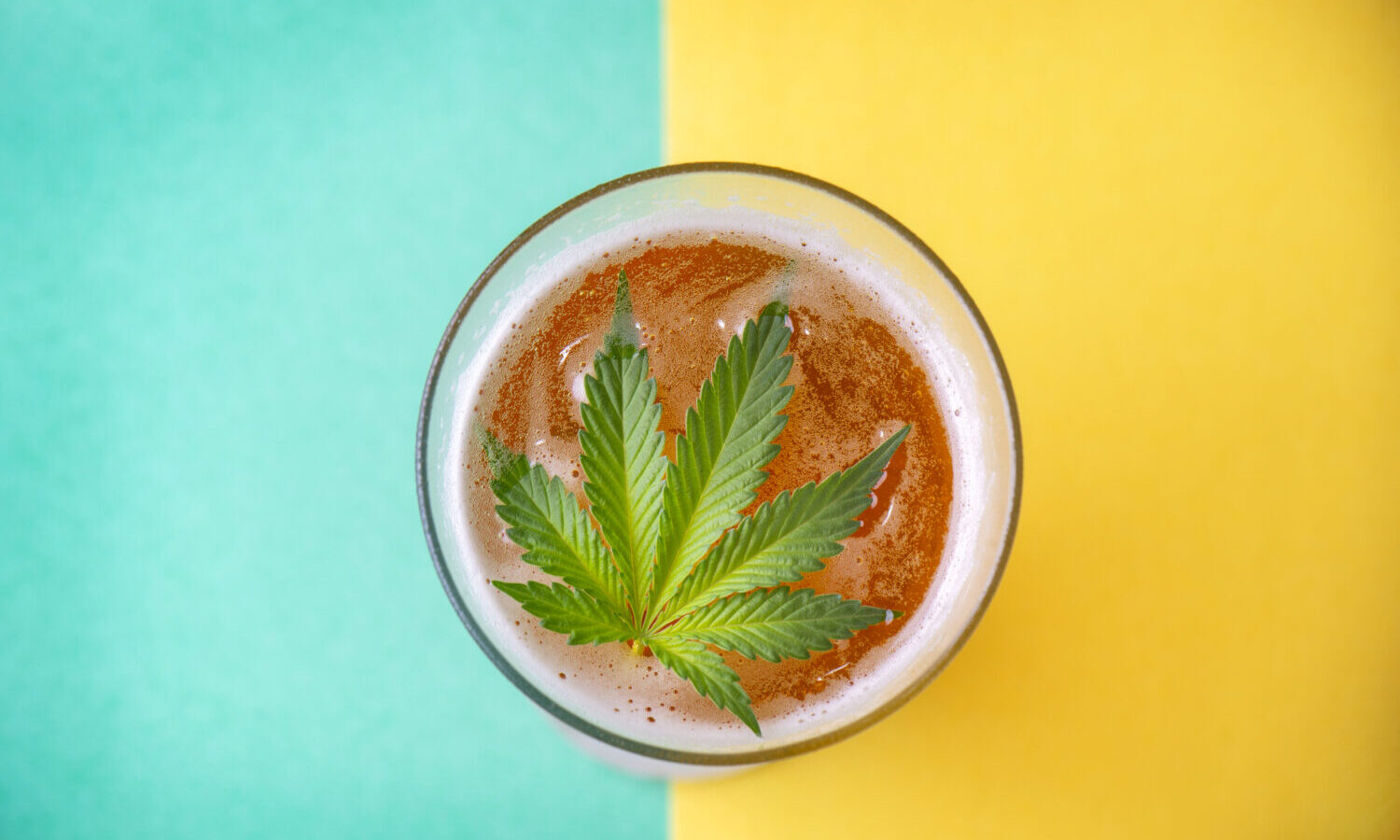Business
Why Cannabis Beverages Are Not Yet Quenching Their Share Of The Market

As cannabis lounges start to open and more mainstream brands launch their twist on a cannabis beverage, it’s hard to see this trend going anywhere but up.
Cannabis beverages have come a long way in a very short time. Technology and science has made it possible to emulsify THC and help these beverages hit the bloodstream quicker, getting the drinker high almost as quick as a joint, and hours faster than a gummy.
At the same time, there is even growing interest from major alcohol brands, with companies like Pabst Blue Ribbon dipping into the cannabis beverage market with their High Seltzer.

There is lots of momentum, plenty of buzz and all the necessary tools for cannabis beverages to make a huge splash in the cannabis market pool. Yet cannabis beverages only make up about 1.1% of the total legal U.S. cannabis market, according to Headset. That’s not exactly a cannon ball; it’s barely a ripple.
So with all these great things working in its favor, why haven’t cannabis beverages caught on in a more mainstream way as of yet?
The first reason is not so shocking — cannabis in all its forms is still illegal on a federal level. With a federal prohibition still in play, it means there is all sorts of red tape to navigate. States have different laws when it comes to edibles and cannabis beverages. You also can’t transport cannabis over state lines like you can with beer or any other canned beverage. This poses all sorts of logistical issues, and all of these hurdles add up. And according to CNBC, “This keeps many companies from growing in a significant way, which has led to some pulling back on their efforts in the market and others giving up completely.”
There is also the convenience factor to consider, and when it comes to discretion and convenience, edibles win or beverages every time. “One reason for this is the category dominance of candy edibles, particularly gummies, which have an advantage over beverages because they offer convenience and portability, two factors that are top product choice influencers according to BDSA Consumer Insights,” BDSA’s chief commercial officer Jessica Lukas told Beverage Industry.
She then added another reason, which has less to do with consumer interest, and more to do with cost. “Another reason is that cannabis beverages present more logistical issues to distributors and retailers, as most beverage products are more costly to transport and store at retail than smaller and lighter edible form factors,” Lukas continued. Cannabis beverages are heavy and bulkier than almost any other type of weed product. This makes them more expensive to ship.
The size and volume of cannabis beverages can lead to other challenges in addition to shipping costs. There is also the struggle of finding space on the often-small retail portion of a dispensary to showcase the products to consider.

“If canned cannabis beverages were allowed in grocery stores, I think it would become a top-five beverage category,” Petalfast CEO Jason Vegotsky told Beverage Dynamics told Beverage Dynamics. “Instead, right now the main channel for cannabis beverages is dispensaries,” Vegotsky continued. He explained in the interview that dispensaries pose all sorts of selling challenges for cannabis beverages. After all, most dispensaries have limited to zero refrigeration space (cold beverages are much more appealing after all).
Also, each can takes up significantly more space than an entire pack of gummies. Some states don’t even allow the beverages to be showcased at dispensaries, and if they do, the odds of a dispensary giving up much of their limited real estate for this still-small portion of the market is pretty unrealistic.
While getting the cans on shelves and in the hands of new customers is definitely a challenge currently, many are optimistic that this is a temporary issue, sort of like a growing pain. “It’s so hard to get your elbow in the door, but if you have a product that has repeat purchase or loyalty, within two to three months, the retailer gets it,” Luke Anderson, co-founder of cannabis drink brand CANN, told Bloomberg.
After all, while cannabis beverages have had a slow start, the market has big goals, and even bigger backers.
As cannabis lounges start to open and more mainstream brands launch their twist on a cannabis beverage, it’s hard to see this trend going anywhere but up. “There have been multiple false starts for anointing beverages the next big thing,” Travis Tharp, CEO of Keep Brands, told CNBC. “But I think we’ve gotten to a point where we are showing that the year over year growth is something that is substantial.”
Business
New Mexico cannabis operator fined, loses license for alleged BioTrack fraud

New Mexico regulators fined a cannabis operator nearly $300,000 and revoked its license after the company allegedly created fake reports in the state’s traceability software.
The New Mexico Cannabis Control Division (CCD) accused marijuana manufacturer and retailer Golden Roots of 11 violations, according to Albuquerque Business First.
Golden Roots operates the The Cannabis Revolution Dispensary.
The majority of the violations are related to the Albuquerque company’s improper use of BioTrack, which has been New Mexico’s track-and-trace vendor since 2015.
The CCD alleges Golden Roots reported marijuana production only two months after it had received its vertically integrated license, according to Albuquerque Business First.
Because cannabis takes longer than two months to be cultivated, the CCD was suspicious of the report.
After inspecting the company’s premises, the CCD alleged Golden Roots reported cultivation, transportation and sales in BioTrack but wasn’t able to provide officers who inspected the site evidence that the operator was cultivating cannabis.
In April, the CCD revoked Golden Roots’ license and issued a $10,000 fine, according to the news outlet.
The company requested a hearing, which the regulator scheduled for Sept. 1.
At the hearing, the CCD testified that the company’s dried-cannabis weights in BioTrack were suspicious because they didn’t seem to accurately reflect how much weight marijuana loses as it dries.
Company employees also poorly accounted for why they were making adjustments in the system of up to 24 pounds of cannabis, making comments such as “bad” or “mistake” in the software, Albuquerque Business First reported.
Golden Roots was fined $298,972.05 – the amount regulators allege the company made selling products that weren’t properly accounted for in BioTrack.
The CCD has been cracking down on cannabis operators accused of selling products procured from out-of-state or not grown legally:
- Regulators alleged in August that Albuquerque dispensary Sawmill Sweet Leaf sold out-of-state products and didn’t have a license for extraction.
- Paradise Exotics Distro lost its license in July after regulators alleged the company sold products made in California.
Golden Roots was the first alleged rulebreaker in New Mexico to be asked to pay a large fine.
Source: https://mjbizdaily.com/new-mexico-cannabis-operator-fined-loses-license-for-alleged-biotrack-fraud/
Business
Marijuana companies suing US attorney general in federal prohibition challenge

Four marijuana companies, including a multistate operator, have filed a lawsuit against U.S. Attorney General Merrick Garland in which they allege the federal MJ prohibition under the Controlled Substances Act is no longer constitutional.
According to the complaint, filed Thursday in U.S. District Court in Massachusetts, retailer Canna Provisions, Treevit delivery service CEO Gyasi Sellers, cultivator Wiseacre Farm and MSO Verano Holdings Corp. are all harmed by “the federal government’s unconstitutional ban on cultivating, manufacturing, distributing, or possessing intrastate marijuana.”
Verano is headquartered in Chicago but has operations in Massachusetts; the other three operators are based in Massachusetts.
The lawsuit seeks a ruling that the “Controlled Substances Act is unconstitutional as applied to the intrastate cultivation, manufacture, possession, and distribution of marijuana pursuant to state law.”
The companies want the case to go before the U.S. Supreme Court.
They hired prominent law firm Boies Schiller Flexner to represent them.
The New York-based firm’s principal is David Boies, whose former clients include Microsoft, former presidential candidate Al Gore and Elizabeth Holmes’ disgraced startup Theranos.
Similar challenges to the federal Controlled Substances Act (CSA) have failed.
One such challenge led to a landmark Supreme Court decision in 2005.
In Gonzalez vs. Raich, the highest court in the United States ruled in a 6-3 decision that the commerce clause of the U.S. Constitution gave Congress the power to outlaw marijuana federally, even though state laws allow the cultivation and sale of cannabis.
In the 18 years since that ruling, 23 states and the District of Columbia have legalized adult-use marijuana and the federal government has allowed a multibillion-dollar cannabis industry to thrive.
Since both Congress and the U.S. Department of Justice, currently headed by Garland, have declined to intervene in state-licensed marijuana markets, the key facts that led to the Supreme Court’s 2005 ruling “no longer apply,” Boies said in a statement Thursday.
“The Supreme Court has since made clear that the federal government lacks the authority to regulate purely intrastate commerce,” Boies said.
“Moreover, the facts on which those precedents are based are no longer true.”
Verano President Darren Weiss said in a statement the company is “prepared to bring this case all the way to the Supreme Court in order to align federal law with how Congress has acted for years.”
While the Biden administration’s push to reschedule marijuana would help solve marijuana operators’ federal tax woes, neither rescheduling nor modest Congressional reforms such as the SAFER Banking Act “solve the fundamental issue,” Weiss added.
“The application of the CSA to lawful state-run cannabis business is an unconstitutional overreach on state sovereignty that has led to decades of harm, failed businesses, lost jobs, and unsafe working conditions.”
Business
Alabama to make another attempt Dec. 1 to award medical cannabis licenses

Alabama regulators are targeting Dec. 1 to award the first batch of medical cannabis business licenses after the agency’s first two attempts were scrapped because of scoring errors and litigation.
The first licenses will be awarded to individual cultivators, delivery providers, processors, dispensaries and state testing labs, according to the Alabama Medical Cannabis Commission (AMCC).
Then, on Dec. 12, the AMCC will award licenses for vertically integrated operations, a designation set primarily for multistate operators.
Licenses are expected to be handed out 28 days after they have been awarded, so MMJ production could begin in early January, according to the Alabama Daily News.
That means MMJ products could be available for patients around early March, an AMCC spokesperson told the media outlet.
Regulators initially awarded 21 business licenses in June, only to void them after applicants alleged inconsistencies with how the applications were scored.
Then, in August, the state awarded 24 different licenses – 19 went to June recipients – only to reverse themselves again and scratch those licenses after spurned applicants filed lawsuits.
A state judge dismissed a lawsuit filed by Chicago-based MSO Verano Holdings Corp., but another lawsuit is pending.
Source: https://mjbizdaily.com/alabama-plans-to-award-medical-cannabis-licenses-dec-1/
-

 Business2 years ago
Business2 years agoPot Odor Does Not Justify Probable Cause for Vehicle Searches, Minnesota Court Affirms
-

 Business2 years ago
Business2 years agoNew Mexico cannabis operator fined, loses license for alleged BioTrack fraud
-

 Business2 years ago
Business2 years agoAlabama to make another attempt Dec. 1 to award medical cannabis licenses
-

 Business2 years ago
Business2 years agoWashington State Pays Out $9.4 Million in Refunds Relating to Drug Convictions
-

 Business2 years ago
Business2 years agoMarijuana companies suing US attorney general in federal prohibition challenge
-

 Business2 years ago
Business2 years agoLegal Marijuana Handed A Nothing Burger From NY State
-

 Business2 years ago
Business2 years agoCan Cannabis Help Seasonal Depression
-

 Blogs2 years ago
Blogs2 years agoCannabis Art Is Flourishing On Etsy









